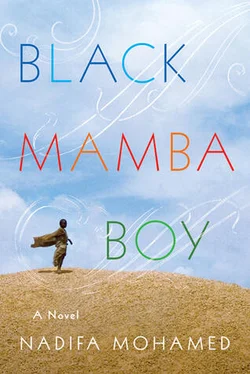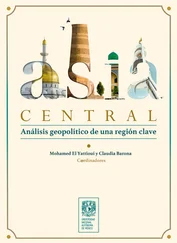“Take a picture quickly, take it!” shouted the Italian. The askaris looked down as their shame was memorialized. The Italian’s buttocks reeked of too much rich food, and his monstrous thighs felt like pythons around their necks. The other Italians applauded and wolf whistled at him, and as soon as he came down, they all wanted to take a similar photograph to send to their brothers, fathers, wives.
Jama staggered to work the next day, malaria pounding at his head and his legs like weights beneath him. He looked up at the hazy sky; he had to approximate the time from the sun and the events around him. He did not understand the Italian’s insistence on arriving at a particular minute, he thought it stupid of the white man to place so much importance on portioning up time into meaningless fragments rather than following the fluid movement of the sun as rational people did. He hurried as fast as he could and saw the Italian waiting at the entrance of the tent, his hands on his hips, his whip curled up in his fist. Jama turned to run away but his legs were too slow, Silvio grabbed him by the back of the neck and dragged him off.
Jama called out, “Help me! Help me!” to the Somali askaris but they stood in fearful silence. Jama was brought to a wooden pen where chickens had been kept. It was empty now apart from floating down feathers and streaks of chicken shit. The Italian stopped and kicked Jama ferociously into the pen.
“How many chances do I have to give you? You should all be wiped out, you good-for-nothings. Stay there or I’ll hunt you down and whip that black skin of yours clean off.”
Jama clutched at his side, fearing his ribs had been broken; he cried out in his mother tongue, “To hell with you! You miserable sister-fucking pig,” but the Italian strode away, not deigning to turn his head.
Jama studied the jagged wound on his palm and felt his bruised ribs and demanded that God kill his offender. The clouds dissolved as the sun rose higher and higher. Jama waited to be let out but no one came for him, he stared longingly at the low gate but was too afraid to let himself out. Shooting pains ran through his body when he tried to lie down. An Eritrean askari he did not know gave him a sip of water, hurrying away before anyone could chastise him. The pain in his side, the scalding sun overhead, the twisting hunger in his gut wrenched out pitiful, hesitant tears. He wanted his mother badly, to salve his wounds and hold him to her breast; she would have fought anyone for him, even the Italian, but without her Jama was a nobody. He felt old and hopeless. If his life ended here in this animal pen there would be no prayers, no tears, nothing to mark his life as being worth more than that of a chicken. His stars had failed him and if his mother was still watching from heaven she could feel nothing but shame. Jama watched a figure approach the pen; it was the crocodile catcher with a small tortoise wriggling in his hands.
“What are you doing in here, boy?” asked the crocodile catcher incredulously.
“That swine put me in here,” replied Jama, gesturing toward the tent with his chin. “Where are you taking that tortoise?” he asked back.
“I thought I would take these madmen at their word. I found this little tortoise in my plot eating my tomatoes, so considering we don’t own anything anymore, I thought I would give it to them to deal with,” and with that the crocodile man spat out a wad of tobacco and marched over to the tent.
The crocodile catcher returned with two askaris and they were all laughing uproariously. The Italian had charged the tortoise with theft and given it a seven-day custodial sentence. Jama was to be its cellmate and guard. They placed the tortoise in the pen more gently than Jama had been thrown in, and the crocodile catcher gave Jama a handful of roasted peanuts from his deep pockets.
“Did he say how long I have to be in here?” Jama called after them.
The crocodile catcher turned back to him. “I don’t know, son, but he is a very strange man, his soul stinks. Don’t worry, we will look out for you. I will bring you food later.”
The crocodile catcher kept his promise, he brought Jama food and water and even grass for the tortoise, and kept Jama company as the sun set and the hyenas laughed their way into town. Jama was frightened and tried to stop the crocodile catcher departing by telling story after story, but in the end the man stretched with a loud yawn and went home. Jama was left alone with the wild animals, ghosts, and mosquitoes, wondering what the repercussions would be if he went home for the night. Askaris were known to report on one another to earn rewards from the Italians. Jama stayed awake all night, shivering with cold and jumping at every rustle and crack in the darkness surrounding him. He had images of a lion leaping over the fence and carrying him away by the throat. He had just fallen asleep when the first askaris began to arrive at the office. The next day he was still not pardoned and he spent it turning the tortoise over and studying its head, limbs, and shell. It was a beautiful thing, one of the most perfect of God’s creations. It moved around ruminatively, picking at stray weeds without a care in the world. Its hard shell was a source of envy to Jama with his fragile, damaged flesh.
Only on the third day, with his skin bitten to death, did the Italian call Jama out of the pen. He stood humiliated and furious in front of his tormenter; the Italian chuckled at the sight of Jama covered in dust, then cleared his throat for the satisfaction of a lecture.
“Alfredo, you have been a nightmare for me. I sometimes felt that you were not all bad and had a few brains, but you have disappointed me at every turn. You have been a total, total disaster as an office boy. I don’t know what that communist Jew-boy was talking about when he praised you, maybe he had needs that you satisfied, but I am made of better stock and I have seen your worthlessness. Get out and don’t come back.”
Jama walked out with huge relief, but the Italian yelled after him. “Hey! Hey! Come back here; never turn your back to your superior, boy! Come here and salute me now!”
Jama ignored him and ran back to the tent, picked up his aday and little savings, put them in his father’s suitcase and left Omhajer.
KEREN, ERITREA, JANUARY 1941
Jama met a group of white-robed and turbaned traders on the road out of Omhajer. A young Sudanese man among them saw the poor state Jama was in and offered him ful medames wrapped in flatbread. They rode a lorry together toward Abyssinia, and before long the trader had agreed to employ Jama as a tea boy in his stalls in K’eftya and Adi Remoz, towns in the vast highlands of the Gondar region. They traveled for five days in the back of the lorry, marveling at the paradise they passed through; the landscape was a juicy emerald green, beside the dirt track were wild mango trees full of frolicking, singing birds, herds of giraffe and zebra gathered around blue watering holes. Jama would have been happy to jump off the lorry and stay in this small heaven but shiftas and patriots lurked among the trees and long grass. It was unsettling to see a place so lush, so full of promise, without one tukul or any kind of human dwelling. They did not see a soul until they reached the outskirts of K’eftya, where Jama and the Sudanese trader jumped off. Jama spent listless days walking around K’eftya, selling tea to the few people who could afford it; loneliness and boredom filled his days. He didn’t want to even remember his mother or father, a new bitterness was infecting the way he thought about them; their mistakes had left him in this destitute state. When it rained he waited under a tree, when the sun returned he would walk, he rarely talked to anyone, just eavesdropped on conversations and stared at the women under their colorful umbrellas. The months crawled past. Far away beyond the mountains, someone else’s bad decisions were about to throw his life into a deeper maelstrom. To crowds of millions, by radio and by special appearances, Benito Mussolini — hands clasping his belt and chin pushed into the air — declared tribal war on Britain and France with proclamations of “Vincere! Vincere! Vincere!”
Читать дальше
Конец ознакомительного отрывка
Купить книгу












